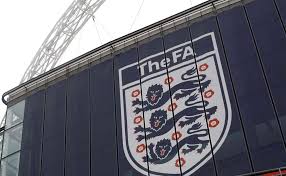By David Owen
May 4 – The Football Association managed to report a small profit and to invest nearly £150 million in the sport in 2019-20, in spite of being hard hit by the early months of the covid pandemic.
The Wembley-based body posted a pre-tax profit of £2.9 million for the year to end-July, down from £57 million in 2018-19, after what chief executive Mark Bullingham described – not surprisingly – as “a very challenging year”. By “effectively closing” the football business for an extended period, covid had delivered “a significant body blow to the organisation and the game as a whole”, Bullingham said.
The FA had responded with “severe cuts”, intended to take £75 million a year out of its cost-base.
“We have lost all of the revenue from events at Wembley Stadium since March 2020 and all other future bookings, such as the music concerts in August and the NFL games in October,” Bullingham explained. He went on: “Our hospitality revenue from Wembley Stadium, which usually delivers around £35 million per year, has been heavily impacted, and will probably take years to recover.”
The FA quantified the immediate impact of covid at £35.7 million of revenue deferred owing to rescheduled fixtures, a £2 million restructuring provision and £30.4 million of “in-year losses”.
The profit for the year was achieved on turnover down around 28% at £335.1 million. Broadcasting generated £210.7 million of this, a year-on-year drop of £51.8 million, while sponsorship contributed £53.3 million, down just over £10 million. Both events income and Club Wembley income fell heavily.
After administrative expenses down £15.7 million at £140.9 million, the operating profit weighed in at £9.8 million, down from £62.8 million.
Staff numbers actually rose in the year under scrutiny to a monthly average of 1,210. Aggregate remuneration similarly edged up to £65.3 million. This included £2.86 million of severance costs, and was in spite of the total being net of £3.2 million of contributions from the UK Government, via its Coronavirus Job Retention Scheme. In his first full year as chief executive, Bullingham was paid £524,000.
At year-end, the FA said it had drawn £137 million of a £250 million revolving credit facility, available through Barclays, Santander and NatWest, up £19 million. A “subsequent events” Note in the accounts appears to indicate, however, that this facility – secured against the value of Wembley and bearing interest at LIBOR plus 1.9% – had been fully repaid. By contrast, £175 million of short-term funding secured through the UK Government covid corporate financing facility, had been “drawn in full”.
The FA also noted that during the year it had taken advantage of the Government’s VAT deferral scheme by deferring payments totalling £12.6 million.
Contact the writer of this story at moc.l1745646176labto1745646176ofdlr1745646176owedi1745646176sni@n1745646176ewo.d1745646176ivad1745646176

